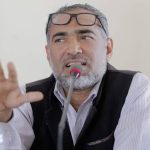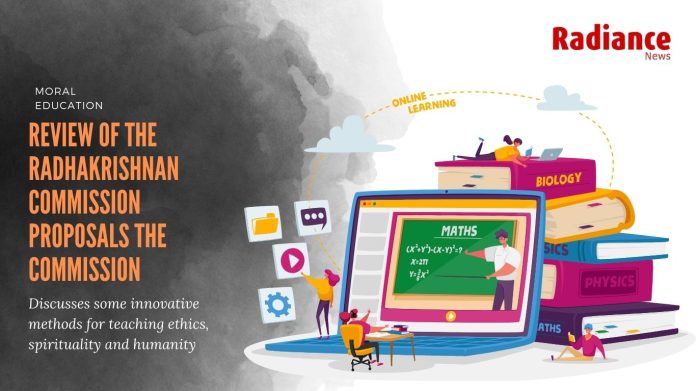The commission discusses some innovative methods for teaching ethics, spirituality and humanity

The Radhakrishnan Commission discussed religious education in detail in the eighth chapter. The commission has also referred to the discussions held in the Constituent Assembly. The following points have been derived by us from the arguments of Dr Bhimrao Ramji Ambedkar, President of the Constitution Drafting Committee.
It makes two things clear:
1) No religious education can be imparted in government or government-funded educational institutions as the financial needs of the governmental institutions are met by the government through its treasury, which in turn is raised through taxes from the public. If a person is a follower of a particular religion, why should he/she financially support the education of another religion? This practice is contrary to the basic objectives and rationale of tax collection. Dr Ambedkar also said that the teaching of a particular religion in government schools is a violation of the country’s tax policy and tax laws.
2) Another argument made by Dr. Ambedkar was that such educational institutions which are run by private institutions, trusts and societies and who are not running with the support of the government can provide religious education, but the students or their parents should not be involved in such arrangements. Participation (in these classes imparting religious education) should not be compulsory. This would be against the law of the Constitution of India, which is mentioned in Article 21 of the (Draft) Constitution that deals with freedom of conscience.
This discussion makes it evident that educational institutions, which are self-sufficient and do not run with the financial support of the government, can provide religious education in their institutions. However, over the years some educational institutions were harassed for imparting religious education in their schools. Upon further investigation, it became clear that the educational institution, which is affiliated with an education board, has to adopt the regulations and curriculum of that particular board.
During the debates in the Constituent Assembly, Dr Ambedkar said that the curriculum and textbooks should not include material promoting any religion, but religious material can be included for imparting information or for research at higher levels. This elucidation by Dr Ambedkar seems appropriate in the context of Indian society.
In another place, Dr Ambedkar explains his position and writes that if freedom of religious education is given in government schools, the rights of different religious denominations living in the country will not be honoured. The dominant religion will try to give its own religion more pre-eminence.
NCERT (National Council of Educational Research and Training) is responsible for preparing the syllabus and books for education up to class 12 in India. This institution prepares guidelines for the preparation of books. In the guidelines that are issued, it is illegal to include religious beliefs or preach religious beliefs in the book for any subject.
In its report, the commission has also discussed some innovative methods for teaching ethics, spirituality and humanity, two of which are as follows:
1) World Religions: The commission believes that the teachings of all religions should be integrated into the teaching of ethics rather than the fundamental beliefs of religions. A book should be compiled on the above lines and taught in our universities.
2) Indian Religion: The Commission also suggested that a book be prepared under the title of “Indian Religion.” The book should include the doctrines and morals of different religions should be collated, which are acceptable to all. In addition, the attributes derived from the Preamble of the Constitution of India should be added so that we can prepare the citizens required by the country according to the Indian Constitution of India. “Natural religion” is also mentioned thus – “An attempt should be made to prepare a moral textbook based upon the fundamental principles of natural religion such as may be taught in all Government and non-Government Colleges”. Natural religion refers here to those high morals that have not been negated by any religion.
After a lengthy discussion on religious education and moral pedagogy, the commission made a four-point recommendation to the central government:
- “That all educational institutions start work with a few minutes for silent meditation.” The kind of silent meditation solicited is not specified clearly. Yes, however, while discussing its purpose, the commission has written that its purpose will be to create spirituality among the students. Was the commission referring to “yoga”?
- “That in the first year of the Degree course lives of the great religious leaders like Gautama the Buddha, Confucius, Zoroaster, Socrates, Jesus, Somkara, Ramanuja, Madhava, Mohammad, Kabir, Nanak, Gandhi, be taught.” Among the personalities mentioned by the commission was the name of Prophet Muhammad ﷺ. If this recommendation is accepted, then the educated youth of the country would at least be familiar with the basic teachings of religions and the deluge of misunderstanding would be reduced.
- “That in the second year some selections of a universalist, character from the Scriptures of the world be studied.”
- “That in the third year, the central problems of the philosophy of religion be considered.” It was like a proposal for a critical study of religions.
Apart from the fourth recommendation, all the above suggestions were feasible but no practical program could be designed based on them. Some observers believe that these proposals were opposed by communist intellectuals and the Brahmin lobby.
Nevertheless, it is undeniable that the Dr Radhakrishnan Commission has explicitly discussed the education of religion and ethics in colleges and universities in detail. Most of these topics are necessary for reforming society and should be discussed again in our educational institutions and other platforms with special reference to the kind of citizens that we aspire to create. Do we wish to create citizens who support mob lynching and present arguments in favour of it or the citizens who consider mob lynching not only an inhuman act but also a heinous crime and an act of extreme cruelty and brutality? Unfortunately, centres of learning are fast becoming centres of hatred. Sadly, we are concerned about moral education in “our” (Muslim) educational institutions, but we are not bothered about other educational institutions. The fire of hate and division that is being lit there today can cause serious harm to the nation if we continue to ignore it.
(to be continued)




